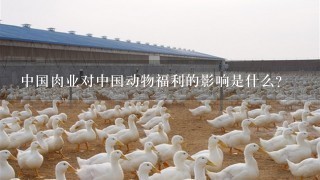中国肉业对中国动物福利的影响是什么?

China's meat industry has a significant impact on Chinese animal welfare. Here are some key points to consider:
Positive impacts:
- Improved animal welfare: Chinese regulations and practices have significantly improved animal welfare in the meat industry. This includes stricter standards for housing, feeding, and care for animals raised for meat.
- Reduced animal suffering: By implementing these regulations, fewer animals suffer from inhumane practices such as overcrowding, lack of proper nutrition, and cruel mutilations.
- Enhanced food safety: Stricter regulations and monitoring ensure that meat products are safe and free from harmful pathogens. This protects public health and ensures a reliable food supply.
Negative impacts:
- Overproduction and waste: The rapid growth of China's meat industry has led to overproduction and waste. This results in the unnecessary suffering and death of millions of animals, particularly in the poultry and pork industries.
- Unsanitary practices: Some meat processing facilities lack adequate hygiene and sanitation, posing a risk of foodborne illnesses.
- Use of antibiotics and hormones: Some antibiotics and hormones are still used in Chinese meat production, raising concerns about their impact on animal health and the environment.
Overall, the impact of China's meat industry on animal welfare is mixed. While there have been significant improvements, there are still challenges and areas for improvement. It is important to monitor the situation and to advocate for further progress towards humane and sustainable practices.
Additional points to consider:
- China's meat industry is heavily concentrated, with a large number of small and medium-sized farms. This can make it difficult to implement strict regulations and monitor practices.
- The rapid urbanization and industrialization of China are also putting pressure on the meat industry, leading to increased demand for meat products and putting further pressure on animal welfare.
- There is a growing movement in China to promote more humane and sustainable practices in the meat industry. This includes consumer awareness, advocacy, and support for initiatives such as organic farming and certification.
It is important to stay informed about the latest developments in China's meat industry and to hold stakeholders accountable for ensuring that animals are treated with respect and compassion.





































































